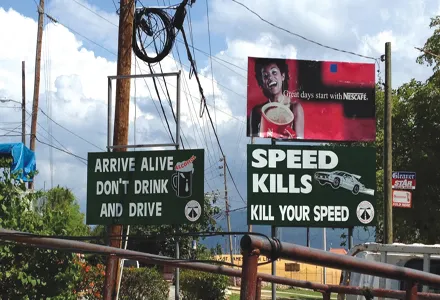A new partnership between Jamaica and the UK is intended to reduce road deaths in the Caribbean country. This novel agreement on improving road safety forms part of international twinning programme. The Inter-American Development Bank (IDB) and the International Transport Forum (ITF) at the OECD are joining forces for this twinning initiative. Under the programme Jamaica and the UK will promote the implementation of best practices in road safety data collection. The goal of the twinning is to help Jamaica a
April 11, 2013
Read time: 3 mins
RSSA new partnership between Jamaica and the UK is intended to reduce road deaths in the Caribbean country. This novel agreement on improving road safety forms part of international twinning programme. The 2791 Inter-American Development Bank (IDB) and the 1102 International Transport Forum (ITF) at the OECD are joining forces for this twinning initiative. Under the programme Jamaica and the UK will promote the implementation of best practices in road safety data collection. The goal of the twinning is to help Jamaica align its road safety data to international standards - as recommended by ITF’s International Traffic Safety Data and Analysis Group (IRTAD) - as an important step towards more effective road safety policies. Compared with the Americas as a whole, the share of road deaths in the non-Latin Caribbean is currently more than 2.5 times higher than its share of registered vehicles. The Road Safety Unit of Jamaica’s Ministry of Transport, Works and Housing is leading the way on road crash data in the Caribbean. With the help of the twinning programme, Jamaica will be put into a position to share best practices and knowledge with other countries in the region.
The first aspect of the twinning initiative is currently being carried out by the Transport Research Laboratory (777 TRL) and has the financial support of IDB. It involves a comprehensive review of how data relevant for road safety analyses are collected, stored, analysed in Jamaica, and how they are then used to inform road safety strategies and interventions. As part of the review, the TRL team interviewed representatives from the Jamaican Police Force, Ministry of Health, Ministry of Education, Ministry of National Security, universities and the Maritime Training Institute. During a one-day workshop, participants were presented with crash data systems and how to devise evidence-led road safety policies to more than 70 participants from seven other Caribbean countries (Jamaica, Barbados, Bahamas, Trinidad and Tobago, Suriname, Belize and Guyana) which was organised by IDB.
Under the objectives of the IDB´s Road Safety Strategy for the Latin American and the Caribbean region, the bank aims to support the Latin American countries in strengthening their institutional and technical capacities in road safety throughout activities such this. The International Transport Forum initiated the first road safety twinning programme between Argentina and Spain in 2009, which subsequently led to the creation of the Ibero American Road Safety Observatory. The joint initiative of ITF, IDB and the Jamaican and UK governments forms part of their commitment to the United Nation’s3439 Decade of Action for Road Safety, which aims to stabilise and reduce the number of global road fatalities, currently at 1.3 million/year, by 2020.
The first aspect of the twinning initiative is currently being carried out by the Transport Research Laboratory (
Under the objectives of the IDB´s Road Safety Strategy for the Latin American and the Caribbean region, the bank aims to support the Latin American countries in strengthening their institutional and technical capacities in road safety throughout activities such this. The International Transport Forum initiated the first road safety twinning programme between Argentina and Spain in 2009, which subsequently led to the creation of the Ibero American Road Safety Observatory. The joint initiative of ITF, IDB and the Jamaican and UK governments forms part of their commitment to the United Nation’s









